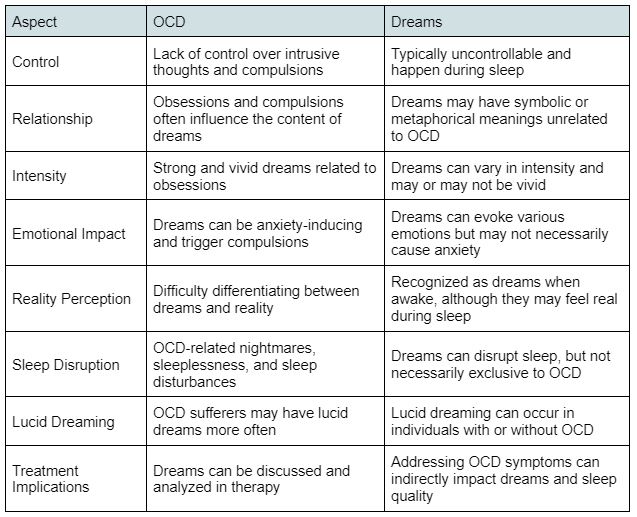What Consequences Arise From The Relationship Between OCD And Dreams?
OCD and dreams intertwine in a complex dance of the mind, where the boundaries between waking life and the realm of the subconscious blur. As we delve into the intricate relationship between OCD and dreams, we uncover a realm where obsessions and compulsions merge with the vivid landscapes of the sleeping mind.
Author:Mia ThompsonReviewer:Calvin PenwellJan 03, 202438.3K Shares697.8K Views

OCD and dreamsintertwine in a complex dance of the mind, where the boundaries between waking life and the realm of the subconscious blur. As we delve into the intricate relationship between OCD and dreams, we uncover a realm where obsessions and compulsions merge with the vivid landscapes of the sleeping mind.
From distressing nightmares that mirror one's obsessions to the elusive line that separates reality from the dream realm, understanding the interplay of OCD and dreams opens a gateway to comprehending the profound impact these nocturnal journeys can have on individuals living with OCD.
OCD And Dreams
It might be challenging to differentiate OCD and dreams. Some individuals with OCD have intrusive ideas or visions that they are unable to control. On the other hand, dreams are typically uncontrollable and happen while you sleep. The two experiences do, however, have certain similarities. OCD sufferers may experience nightmares that are connected to their compulsions and obsessions.
OCD sufferers may dream about their obsessions. For instance, a person with OCD who is preoccupied with germs can dreamabout being sick from bacteria or viruses. A person with OCD who fears making errors could fantasize about acting incorrectly and hurting other people. These kinds of nightmares may make the individual act out their compulsions as a way to cope with their worry since they may be so anxiety-inducing.
Dreams involving repeatedly washing one's hands may occur to someone who has a hand-washing obsession. Dreams of being exposed to a terrible infection may occur to someone terrified of contamination. These kinds of nightmares may be quite distressing, and the individual may act out their compulsions as a way to cope with their anxieties.
Though they may also be a regular aspect of life, dreams can also be an indication of OCD. Most individuals experience dreams every night, and everyone has them. Dreams can have symbolic or metaphorical meanings, and they frequently don't mean what they first seem to imply. Dreams, however, could be more real and literal for those who have OCD. Because of this, it could be difficult to tell a regular dream from an OCD dream.
To better understand the relationship between OCD and dreams, let's compare and contrast the characteristics of OCD and dreams in the following table:
As shown in the table, there are several notable distinctions between OCD and dreams. While OCD involves intrusive thoughts and compulsions that individuals struggle to control, dreams typically occur during sleep and are uncontrollable.
However, there are similarities as well, as OCD-related nightmares can be distressing and may prompt individuals to act out their compulsions even while asleep.
What Is The Link Between OCD And Dreams?
Dreams and OCD are strongly correlated. OCD sufferers often have strong, vivid dreams that are connected to their obsessions. A person with OCD, for instance, would dream about being hunted by a killer or being sick. These kinds of nightmares may be quite upsetting and can trigger more worry and compulsions.
A person with OCD is more likely to have a dream than the average person to be:
- Vivid
- Intense
- Related to their obsessions
OCD does not have a single known cause, however, it is thought that a mix of genetic and environmental variables may contribute to the disorder. Evidence also points to an increased risk of some brain abnormalities in OCD sufferers. These anomalies may cause intrusive thoughts and compulsions and may affect how the brain processes information.
In addition, because of how the brain functions when sleeping, OCD and dreams are related. Our brains' emotional and memory-related areas are more engaged when we dream. This implies that because of the way their brains process information when they sleep, OCD sufferers may be more prone to experience dreams that are connected to their obsessions.
Help is available if you or someone you know is suffering from OCD. Speak to a mental health expert who can help you comprehend what's happening if you have concerns about your dream life. Create a strategy to address your issues as well.
Consequences Of OCD And Dreams
Let's study and comprehend the effects of OCD now that we are aware of their relationship to dreams.
- People with OCD often struggle to tell the difference between reality and dreams, which is one of the primary effects. Confusion and frustration may result greatly from this. Additionally, it might be risky since those with OCD can act out their fantasies.
- Another effect is that individuals with OCD often have vivid, realistic nightmares. These dreams often have something to do with the person's obsessions. For OCD sufferers, this may be quite upsetting since it may make them feel as if they are in a nightmare. In addition, it might cause individuals to forego sleep completely out of fear of experiencing another vivid and realistic dream.
- Other issues including nightmares, sleep paralysis, and night terrors might result from this disruption and volatility. Due to their fear of falling asleep and experiencing another terrible dream, OCD patients may also have sleeplessness.
- Additionally, being sleep-deprived may cause additional issues including exhaustion, irritability, and difficulty focusing. It is crucial to remember that each of these effects has the potential to significantly affect a person's quality of life. If you are battling with the effects of OCD and nightmares, it's crucial to get treatment. There are several resources accessible to you.
- The phenomenon of lucid dreaming is another. This describes a dream in which the dreamer is conscious of their dreaming. Those who suffer from OCD may have lucid dreams more often than those who do not. Lucid dreaming has both advantages and disadvantages. On the one hand, it might be advantageous since it enables OCD sufferers to confront their worries and concerns. However, it may also be quite upsetting since it can make the individual feel as if they are in a nightmare.
If you are battling with the effects of OCD and nightmares, it's crucial to get treatment. Several resources at your disposal may assist you. You need to discuss your experiences with your doctor as well. They could have some useful suggestions for dealing with your issues.
How Does OCD Affect Your Sleep?
OCD is a sort of anxiety disease that may result in a great deal of bothersome, unwanted thoughts as well as compulsions to carry out certain behaviors. This may cause considerable anxiety and make it challenging to go about daily tasks. OCD may have a variety of effects on your ability to sleep.
Certain OCD subtypes are connected to sleep. For instance, somnambulism OCD is defined by a dread of acting out nightmares or sleepwalking. This may cause extreme anxiety before sleeping and result in sleeplessness. The anxiety of sleepwalking or acting out nightmares contributes to the trouble remaining asleep experienced by those with this kind of OCD.
OCD in other forms might also have an indirect impact on your sleep. For instance, having contamination OCD may cause you to spend a lot of time obsessively cleaning, which may make it challenging to unwind at night and get adequate rest. Before you can go to bed, you can spend hours examining everything in your house if you have a checking obsession, which can be detrimental.
OCD sufferers have a difficult time falling asleep because their minds race. They can also have trouble sleeping if they have nighttime routines or compulsions that they must follow. Sleep deprivation may result from this, which may make OCD symptoms worse.
Additionally, OCD sufferers could have more dreams than the average person. These dreams may even include themes based on the person's obsessions and phobias, which may be quite upsetting.
Will OCD Give You Nightmares?
Again, clinical research on this aspect of OCD is in its early stages, so there isn't a clear-cut solution. Simply put, there aren't enough research with conclusive findings that can demonstrate (or refute!) links between OCD and dreams, therefore physicians are currently mostly gathering clinical and anecdotal information on the subject.
According to several research, people with OCD have considerably worse nightmares than those without the disorder, and over time, receiving continuous therapy reduces the unpleasant content of dreams. There is no connection at all between OCD and dreams in some patients, whereas in others there isn't much of a difference and all patients report having very nervous nightmares.
There may be anecdotal accounts of individuals engaging in compulsions while they are asleep or experiencing OCD-related nightmares, but there is no simple solution since everyone with OCD behaves in somewhat different ways.

How To Get Out Of Chronic OCD
Top Sleep Improvement Strategies For OCD Patients
Numerous studies indicate that receiving little or poor sleep may be harmful to mental health in a variety of ways, which raises the likelihood that it might also be harmful to your OCD, particularly during times of increased stress and worry.
Therefore, you must make an effort to give yourself a good night's sleep every night by adhering to a few recommended practices. If you wish to improve the effectiveness of your treatment for OCD, you may also want to discuss with your doctor the possibility of including sleep therapy. Here are a few simple suggestions that you may use right now. You can also read our whole tip guide here.
- Make it obvious where you are awake and where you are sleeping. Try to keep your bedtime limited to sleeping and avoid working, browsing, or doing anything else that can cause you to have unwelcome thoughts. In this manner, your bed becomes merely a place to sleep and unwind when you get into it rather than being filled with stimuli that can divert your attention.
- Establish a routine by making an effort to go to bed and rise at the same times each day. The most important thing is to attempt to establish a pattern, routine, and constant cycle so that you may find stability and comfort. This doesn't have to be really early or extremely late.
To include your sleeping issues in your ERP, it may be quite good to discuss them with your OCD therapist. However, keep in mind that this will take time. Before you discover anything that works for you, it may take some time, and there may be a high learning curve at first.
People Also Ask
Can Changes In Sleep Patterns Trigger OCD Symptoms?
Disruptions in sleep patterns, such as irregular sleep schedules or insufficient sleep, can potentially trigger or worsen OCD symptoms in susceptible individuals.
Can Lucid Dreaming Be Helpful For Individuals With OCD?
While lucid dreaming may offer opportunities for individuals with OCD to confront their fears, it can also potentially intensify feelings of anxiety and distress.
Are There Any Natural Remedies That Can Promote Better Sleep For Individuals With OCD?
Incorporating relaxation techniques like mindfulness meditation, creating a calming bedtime routine, and maintaining a sleep-friendly environment can all contribute to better sleep for individuals with OCD.
Conclusion
While the relationship between OCD and dreams can be complex, exploring the connections and understanding their implications can provide valuable insights for individuals struggling with OCD and sleep disturbances. By addressing OCD symptoms and prioritizing healthy sleep habits, individuals can enhance their quality of life and mitigate the disruptive effects of OCD and nightmares.

Mia Thompson
Author
Mia Thompson is a versatile writer at Kansas Press, delving into a range of topics including news, spiritual exploration, astrology, and numerology. With a passion for delivering insightful and informative content, Mia's articles provide readers with valuable perspectives and thought-provoking insights into these intriguing subjects.
She is dedicated to creating content that resonates with readers and fosters a deeper understanding of complex topics.

Calvin Penwell
Reviewer
Since diving into numerology in 1997, my path has been marked by extraordinary encounters and insights. A pivotal moment was uncovering a forgotten numerological manuscript in a tucked-away Italian library, which deepened my connection to the ancient wisdom of numbers. Another transformative experience was a meditation retreat in Nepal's tranquil mountains, where I honed my intuition and the art of interpreting numerical vibrations.
These adventures have not only enriched my numerological practice but also my ability to guide others towards understanding their destiny and life's purpose. My approach is deeply personal, rooted in a blend of historical knowledge and intuitive insight, aimed at helping individuals find their alignment with the universe's abundant energies. My mission is simple: to share the power of numerology in illuminating paths to abundance and fulfillment.
Latest Articles
Popular Articles


